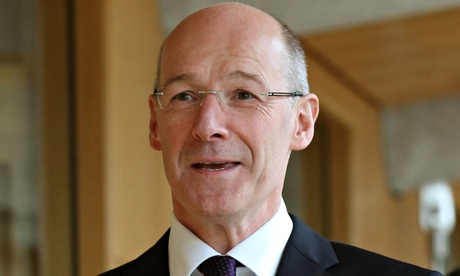Scottish government unveils ‘mansion tax’ plan
Finance secretary John Swinney says progressive system will boost affordability of homes for less well-off and first-time buyers

A new “mansion tax” has been introduced by Scottish ministers to fund a cut in sales duty on affordable homes.
The land and building transaction tax, which takes effect from April next year, has a progressive scale of rates, under which buyers of homes worth £1m, for example, will pay £78,300 in tax, compared with £50,000 under the current stamp duty system.
House sales under £135,000 – £10,000 above the stamp duty threshold, and higher than Scotland’s average house price – will be exempt from the tax. , the new rates will see the burden of property taxes fall on any house buyer spending more than £325,000.
For a £400,000 family home, that would rise from £12,000 to more than £17,000, leading to Tory accusations that the SNP was guilty of an “assault on aspiration”.
With Scottish ministers fighting for Holyrood to be given far greater tax powers from the UK government, including over income tax, Swinney said that was a sign of the Scottish National party’s approach to a fairer taxation system in Scotland.
In England, Labour is proposing an annual tax on mansions – houses worth more than £2m – whereas the Scottish tax is a one-off sales tax. Scotland’s finance secretary, John Swinney, said the move would boost the affordability of homes for the less well-off and first-time buyers. “We will do all we can within the powers available to this parliament to ensure the people of Scotland are able to live in a more prosperous and much fairer country,” he said.
Tories accused the SNP of an “assault on aspiration”, and estate agents said the system would penalise people who were not cash rich but needed to live in more expensive areas.
The Scottish Greens and the housing charity Shelter said the measure failed to address the more significant issues of a lack of affordable new homes and the council tax system, which greatly benefits wealthier homeowners whose property values are soaring.
Graeme Brown, director of Shelter Scotland, said Swinney should spend £200m to build 10,000 new homes a year – well over the £125m he had found by cutting the government’s enterprise budget.
“The commitment to deliver only 4,000 social rented homes is a missed opportunity and shows the Scottish government’s ambition falls well short of meeting the expectations of 150,500 people stuck on council house waiting lists,” he said.
Patrick Harvie, co-leader of the Scottish Greens, said it was no longer credible for Swinney to continue sidestepping the future of council tax, eight years after the SNP won power with a promise to introduce a new local income tax. The SNP has frozen council tax rates since coming to power in 2007, but that freeze has benefited the owners of the most valuable homes, who could have been taxed far more than the poorest if local taxation had been reformed.
“There is talk today of a historic moment as new tax rates are set, and yet the one major tax we’ve had control of since 1999 is council tax, which remains unfair and unreformed,” Harvie said.
Swinney was also criticised by Labour and the Tories for failing to invest as much as he could in the NHS, after the Scottish parliamentary library confirmed that Scottish health spending had fallen by 1.2% in real terms since 2009. Swinney said his new budget would lift health spending above £12bn for the first time.
Iain Gray, Scottish Labour’s finance secretary, said: “The reality is that health spending in Scotland has not kept pace with spending in England and we know Scottish government plans are being worked on for £450m in cuts. The Scottish government has yet again failed to deliver a fully progressive budget, failed to tackle the underfunding of local government and failed to address the swingeing cuts to college budgets.”
Ruth Davidson, the Scottish Tory leader, said the Holyrood research confirmed the findings of an earlier report by the Institute of Fiscal Studies. “There is no getting away from the fact that Alex Salmond has presided over cuts to Scotland’s NHS. [He] has tied himself up in so many knots on the issue of NHS cuts that he could get himself a job as a circus contortionist.”
Source:- http://www.theguardian.com/politics/2014/oct/09/scottish-government-mansion-tax
No comments:
Post a Comment